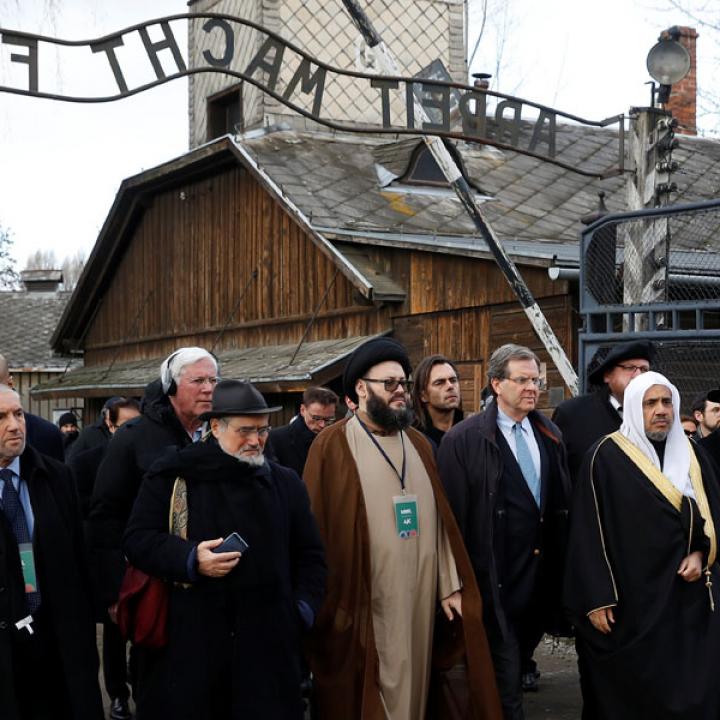
- Policy Analysis
- Fikra Forum
The Holocaust in Arab Collective Consciousness

In addition to official-level initiatives, Arab countries should combat Holocaust denial at the grassroots level to stem the continued spread of hateful conspiracies.
On January 20th 2022, the United Nations adopted a resolution aimed at combatting denial of the Holocaust. The resolution, introduced by Israel and Germany, was adopted by the 193-member General Assembly without a vote. The U.N. said this step sends “a strong message against the denial and distortion of these historical facts.” Although the U.N. resolution on Holocaust denial called on social media companies to “take active measures to combat antisemitism and Holocaust denial or distortion,” anti-Semitic conspiracy theories remain highly prevalent in Arab societies, where they can be seen extensively on social media on a daily basis.
Despite the apparent progress on the issue made by some of the countries partaking in the Abraham Accords, an opinion poll conducted in June 2010 by the Saban Center for Middle East Policy showed that 56% of citizens in the six countries surveyed (Egypt, Jordan, Lebanon, Morocco, and the United Arab Emirates) do not sympathize with the Holocaust, compared to only 3% who do.
This outcome results from decades of inculcation and indoctrination by Arab regimes through a variety of educational institutions. Today, there are those who do not deny the Holocaust occurred, but do not sympathize with its victims. Rather, they believe the Jews got what they deserve. Then there are those who go further than that and promise a repeat of the Holocaust. A large segment of those who deny the Holocaust in Arab countries believe that the Jews died of natural causes or were sentenced to death by the state for criminal reasons, and that the Allied Powers deliberately inflated the number of Jews killed during the war. They also believe that a Jewish propaganda machine has promoted the Holocaust myth to extract huge sums of money from Germany and justify the founding of the state of Israel. They believe there is a great conspiracy involving the victorious countries in WWII, the Jews, and Israel to exploit the Holocaust for their political aims. Of course, the voices of Holocaust deniers have continued to reverberate and have received media support in most Arab countries. After the National Library of Tunisia agreed to host a traveling exhibit of the U.S. Holocaust Memorial Museum in 2018, some Holocaust deniers shut down the museum. Some Tunisian newspapers that reported on this event described their actions as a success.
On the other hand, new initiatives related to Holocaust commemoration at the official level have gained considerable momentum from political and religious figures. In 2009, King Mohammed VI of Morocco issued a statement describing the Holocaust as “one of the most tragic chapters in modern history.” The statement came on the heels of Morocco signing the first archival partnership agreement between an Arab national library and the U.S. Holocaust Memorial Museum. An organization was also established for young Moroccan Muslims, called Mimouna, to preserve the heritage of the local Jewish community and document its experiences during the Holocaust. And in 2018, the Secretary General of the Saudi Arabia-based Muslim World League issued a statement condemning Holocaust denial and visited the Holocaust Museum in Washington, D.C. In 2020, he led a delegation of Muslim clerics on a long and compelling visit to the Auschwitz concentration and extermination camp.
The paucity of information about the Holocaust in many Arab countries is a primary reason for widespread denial. Arab citizens need to see the Holocaust as it is displayed in the museums of Washington and Europe, and understand the stories, photos, and tragedies that millions of families went through. Informing Arab citizens about the Holocaust at a human level and presenting it in a manner close to their reality would make them understand that many of the same tides that have caused tragedies and violence across today’s Middle East are similar to those that caused genocide in Europe in the 20th century. The tragic experiences that the region’s peoples have gone through—from grinding civil wars and terrorism to forced displacement at the hands of extremist religious currents and authoritarian regimes—could prompt Arab citizens to participate in global conversations about raising awareness against genocide and Holocaust denial. There is also a need to integrate education about the Holocaust at different levels in Arab countries to create a generation that is more tolerant and sympathetic to the victims of the Holocaust. Arab countries should also invest in establishing museums that raise public awareness about the Holocaust and the atrocities committed against the Jews. Civil society organizations, especially those concerned with human rights and peace, should also organize activities aimed at raising public consciousness about the Holocaust and the tragedies that Jews were subjected to. Additionally, the entertainment industry in Arab countries could work to produce artistic materials such as plays, films, and drama series that deal with the Holocaust to help raise public awareness about this dark moment in history. Most artistic works that deal with the subject of the Holocaust are in foreign languages and are not available the Arabic-speaking citizens.
Finally, new research in Germany has revealed that Arabs are among the victims of the Holocaust, especially North Africans who were conscripted into the French army. The emergence of this historical truth could provide legitimacy and wider appeal for Holocaust education and commemoration efforts in the Arab world. Some historians have also recently recounted the Arab narrative of the Holocaust: the persecution of hundreds of thousands of Jews who were living in Arab territories that fell under the control of Nazi Germany, Vichy France, or Fascist Italy. These historians have also highlighted the role played by Arabs as perpetrators, bystanders, and even rescuers. These findings could be leveraged to raise awareness about the Holocaust across the Middle East and stem the trend of Holocaust denial.


